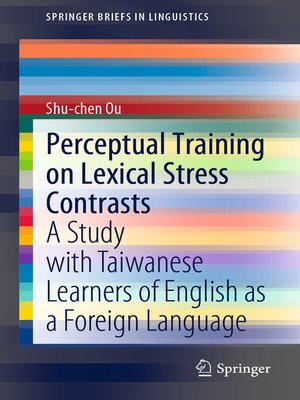Perceptual Training on Lexical Stress Contrasts
ebook ∣ A Study with Taiwanese Learners of English as a Foreign Language · SpringerBriefs in Linguistics
By Shu-chen Ou

Sign up to save your library
With an OverDrive account, you can save your favorite libraries for at-a-glance information about availability. Find out more about OverDrive accounts.
Find this title in Libby, the library reading app by OverDrive.



Search for a digital library with this title
Title found at these libraries:
| Library Name | Distance |
|---|---|
| Loading... |
This book presents the effects of perceptual training on the perception of English lexical stress in rising intonation by Mandarin-speaking EFL learners in Taiwan, and shows that these effects can be positive as well as negative. The book is of interest to researchers in lexical stress and intonation, or issues related to acquisition of L2 suprasegmentals and native-language impact on this process, as well as for those designing a training course on lexical stress for EFL learners, particularly those with a tone language background.
Learning to perceive non-native sound contrasts can be a formidable task, particularly when learners can't rely on cues from their native-language experience. A case in point is Mandarin-speaking EFL learners' perception of lexical stress. They can accurately identify the stress patterns of target words in sentences that have a falling intonation. However, they experience considerable difficulties when the target words are in questions, where the intonation is rising. Where most training studies use only stimuli produced in falling intonation, we implemented a perceptual training program to examine whether Mandarin-speaking EFL learners could learn to perceive English lexical stress in both falling intonation and rising intonation.
Learning to perceive non-native sound contrasts can be a formidable task, particularly when learners can't rely on cues from their native-language experience. A case in point is Mandarin-speaking EFL learners' perception of lexical stress. They can accurately identify the stress patterns of target words in sentences that have a falling intonation. However, they experience considerable difficulties when the target words are in questions, where the intonation is rising. Where most training studies use only stimuli produced in falling intonation, we implemented a perceptual training program to examine whether Mandarin-speaking EFL learners could learn to perceive English lexical stress in both falling intonation and rising intonation.







